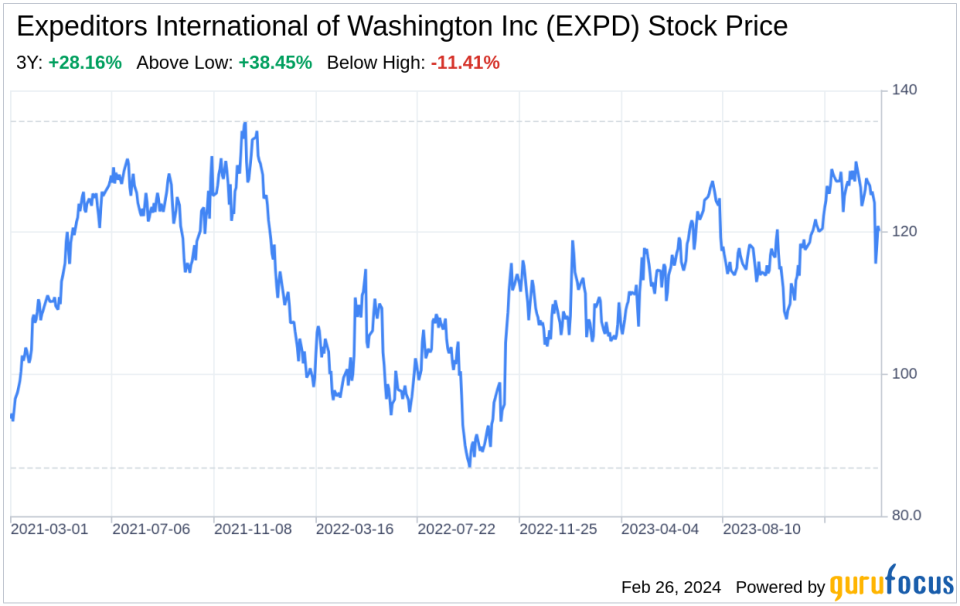Decoding Expeditors International of Washington Inc (EXPD): A Strategic SWOT Insight
Expeditors International of Washington Inc (NYSE:EXPD) showcases robust international logistics capabilities with a strong emphasis on compliance and customer service.
EXPD's non-asset-based model and sophisticated IT systems provide a competitive edge in the global freight forwarding industry.
Despite intense competition, EXPD's organic growth strategy and focus on employee development contribute to its resilience and adaptability.
Global trade uncertainties and the competitive landscape present ongoing challenges that EXPD must navigate to sustain growth.
On February 23, 2024, Expeditors International of Washington Inc (NYSE:EXPD) filed its annual 10-K report, providing a comprehensive overview of its financial performance and strategic positioning in the global logistics industry. As a non-asset-based third-party logistics provider, EXPD specializes in international freight forwarding, offering a suite of services that includes customs brokerage, warehousing, and distribution. The company's financial tables reveal a solid performance, with a market capitalization of approximately $17.7 billion as of June 30, 2023, and a workforce of around 18,000 employees globally. This SWOT analysis delves into the strengths, weaknesses, opportunities, and threats as outlined in the 10-K filing, offering investors a nuanced understanding of EXPD's competitive landscape and future prospects.

Strengths
Global Network and Market Presence: EXPD operates a vast network of 176 district offices across key geographic regions, including the Americas, North Asia, South Asia, Europe, and the Middle East, Africa, and India. This extensive footprint allows the company to serve a diverse customer base and maintain a strong market presence. The strategic distribution of offices ensures that EXPD can offer localized expertise while benefiting from a global reach, a factor that is particularly advantageous in the logistics industry where understanding regional market dynamics is crucial.
Non-Asset-Based Model and IT Systems: As a non-asset-based logistics provider, EXPD is not burdened by the capital expenses and inflexibility associated with owning transportation assets. This model allows for greater agility in responding to market changes and customer needs. Furthermore, EXPD's investment in sophisticated IT systems and technology platforms provides a competitive advantage by enhancing operational efficiency, data analytics, and customer service capabilities. These systems support the company's ability to offer integrated logistics solutions and maintain high levels of customer satisfaction.
Employee Development and Incentive-Based Compensation: EXPD places a strong emphasis on employee development and retention, recognizing that a knowledgeable and motivated workforce is critical to its success. The company's incentive-based compensation model aligns employee interests with company performance, fostering a culture of accountability and excellence. This approach has contributed to EXPD's ability to attract and retain talent, which is a significant strength in the service-oriented logistics industry.
Weaknesses
Dependence on External Service Providers: While EXPD's non-asset-based model offers flexibility, it also creates a dependence on external service providers, such as airlines, ocean carriers, and ground transportation companies. This reliance can expose the company to risks associated with these providers' financial stability, operational capabilities, and regulatory compliance. Any significant disruption or deterioration in these relationships could adversely impact EXPD's ability to deliver services to its customers.
Intense Industry Competition: The logistics industry is highly competitive, with numerous players ranging from niche firms to large multinational corporations. EXPD faces competition on multiple fronts, including pricing, service quality, and technological innovation. The company must continuously adapt and innovate to maintain its competitive position, which can be challenging given the rapid pace of change in the industry.
Exposure to Global Trade Uncertainties: As a company deeply entrenched in international commerce, EXPD is susceptible to fluctuations in global trade dynamics. Factors such as tariff rates, trade barriers, currency exchange rates, and geopolitical tensions can significantly affect the volume of international trade and, consequently, EXPD's business. Navigating these uncertainties requires strategic foresight and adaptability, which can strain resources and impact profitability.
Opportunities
Expansion into Emerging Markets: EXPD's established presence in key regions positions the company well to capitalize on growth opportunities in emerging markets. By leveraging its global network and expertise, EXPD can expand its customer base and increase market share in areas experiencing rapid economic development and increased demand for logistics services.
Technological Advancements: The continued investment in technology and digital solutions presents significant opportunities for EXPD to enhance its service offerings and improve customer experience. Innovations such as advanced tracking systems, data analytics, and automation can lead to increased efficiency, cost savings, and the development of new revenue streams.
Supply Chain Resiliency and Diversification: The COVID-19 pandemic and subsequent supply chain disruptions have highlighted the importance of supply chain resiliency. EXPD can leverage its expertise to assist customers in building more agile and diversified supply chains, positioning itself as a strategic partner in navigating complex global logistics challenges.
Threats
Regulatory Changes and Compliance: The logistics industry is subject to a wide range of regulations that can vary significantly by country and region. Changes in customs, trade, and security regulations can impose additional compliance requirements on EXPD, potentially increasing costs and impacting service delivery. Maintaining compliance in a dynamic regulatory environment is a constant challenge that requires ongoing attention and resources.
Technological Disruption: The emergence of new technology-based competitors, often backed by substantial capital funding, poses a threat to traditional logistics providers like EXPD. These competitors may introduce innovative business models or disruptive technologies that could alter industry dynamics and customer expectations, potentially eroding EXPD's market share.
<
This article, generated by GuruFocus, is designed to provide general insights and is not tailored financial advice. Our commentary is rooted in historical data and analyst projections, utilizing an impartial methodology, and is not intended to serve as specific investment guidance. It does not formulate a recommendation to purchase or divest any stock and does not consider individual investment objectives or financial circumstances. Our objective is to deliver long-term, fundamental data-driven analysis. Be aware that our analysis might not incorporate the most recent, price-sensitive company announcements or qualitative information. GuruFocus holds no position in the stocks mentioned herein.
This article first appeared on GuruFocus.
